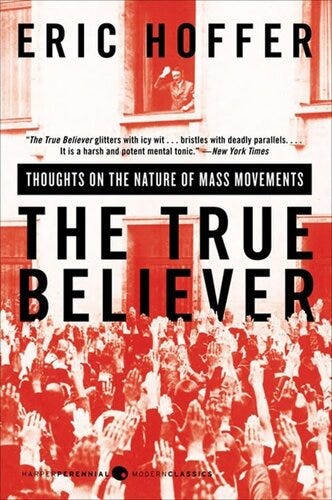Book Freak 169: The True Believer: Thoughts on the Nature of Mass Movements
Eric Hoffer's analysis of how mass movements attract and maintain followers

Eric Hoffer’s The True Believer examines the psychological and sociological factors that lead people to join mass movements. Published in 1951, the book draws insights from major social and political movements of the early 20th century. Hoffer argues that mass movements, whether religious, political, or social, tend to attract similar types of followers and use similar tactics, regardless of their specific ideology.
Four key ideas from the book:
Mass movements need an enemy or scapegoat to unite against
Mass movements can rise and spread without belief in a God, but never without belief in a devil. Usually the strength of a mass movement is proportionate to the vividness and tangibility of its devil. When Hitler was asked whether he thought the Jew must be destroyed, he answered: ‘No…. We should have then to invent him. It is essential to have a tangible enemy, not merely an abstract one.’”
Mass movements need an enemy or scapegoat to unite against, more than they need a positive vision to strive for. Identifying a common enemy gives followers a sense of purpose and belonging.
Those most susceptible to joining mass movements are often dissatisfied with themselves
“The fanatic is perpetually incomplete and insecure. He cannot generate self-assurance out of his individual resources — out of his rejected self — but finds it only by clinging passionately to whatever support he happens to embrace. This passionate attachment is the essence of his blind devotion and religiosity, and he sees in it the source of all virtue and strength. Though his single-minded dedication is a holding on for dear life, he easily sees himself as the supporter and defender of the holy cause to which he clings. And he is ready to sacrifice his life to demonstrate to himself and others that such indeed is his role. He sacrifices his life to prove his worth.”
The movement provides them with a sense of identity and purpose they lack as individuals.
Mass movements are interchangeable
“When people are ripe for a mass movement, they are usually ripe for any effective movement, and not solely for one with a particular doctrine or program. In pre-Hitlerian Germany it was often a toss up whether a restless youth would join the Communists or the Nazis.”
The psychological needs driving people to join movements are often more important than the specific ideologies of those movements. This explains why people sometimes switch between seemingly opposed movements.
People need opportunities for meaningful participation in society
“Where people live autonomous lives and are not badly off, yet are without abilities or opportunities for creative work or useful action, there is no telling to what desperate and fantastic shifts they might resort in order to give meaning and purpose to their lives..”
Healthy societies encourage personal development, exposure to diverse perspectives, critical thinking, and civic engagement to make people less susceptible to the allure of mass movements.
09/7/24





